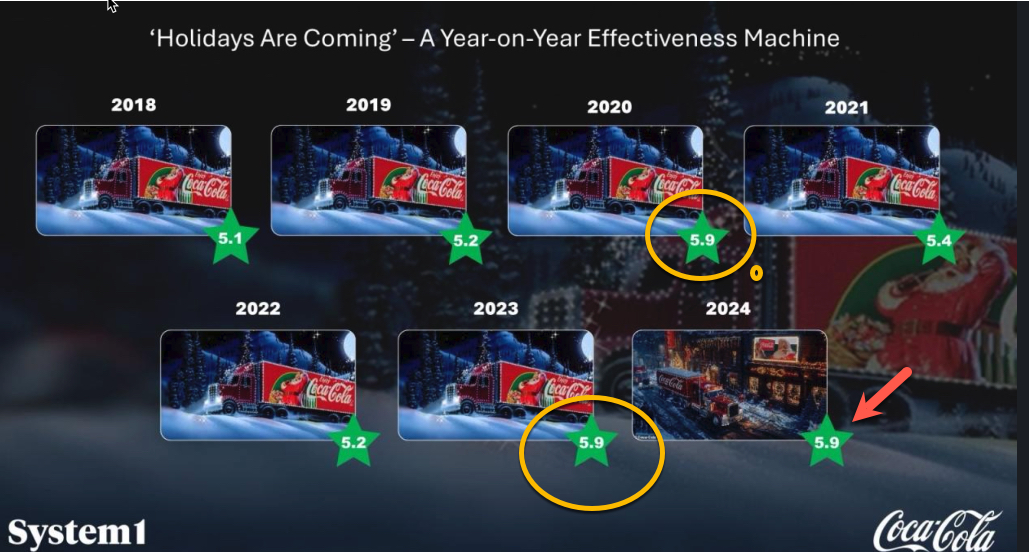AI Ruins Christmas and Other Festive Myths
As the yuletide season descends, Coca-Cola’s annual Christmas ad, a hallowed tradition of red trucks, glowing lights, and syrupy nostalgia, has taken a bold leap into the future—or at least stumbled into the uncanny valley, depending on your perspective.
This year, the elves have been replaced by generative AI, which, as many critics have claimed, is like giving Santa a jetpack: intriguing in theory but terrifying in execution.
The backlash to Coke’s AI-generated ad was swift and savage. Social media erupted with laments that Coca-Cola had “ruined Christmas.” One critic—an agency staffer- declared, “To put out slop like this just ruins the Christmas spirit.” Another disheartened critic, also an agency denizen, dubbed it “heartbreaking,” adding, “Coca-Cola has been the gold standard in branding and advertising for decades.” And Alex Hirsch, the creator of Gravity Falls, (ironically an animated show about self-discovery and growing up) quipped that Coke’s signature red represented “the blood of out-of-work artists”.
Judge for yourself:
Indeed, the AI-generated ad, with its glitchy squirrels, distorted truck wheels, and Santa’s suspiciously rubbery hand, seemed to some more “Nightmare Before Christmas” than holiday cheer. Although critics called out every flaw, from nonsensical Christmas lights to grotesquely oversized bystanders with one noting the ad’s frantic editing: “Ten cuts in 15 seconds, never showing the same thing twice…”
But let’s pause and consider: is this powerful technology truly a failure, or simply an early and not yet perfected view of success? As Kevin noted in his post AI Bias,” Critics say AI lacks depth, nuance, or originality, but the evidence tells a different story. If anything, it’s revealing our biases against what AI can achieve.
“The next time someone dismisses AI as a shortcut to mediocrity, ask them this: Are they basing that opinion on data—or just on what “everyone knows”? Because what we know for sure might just need a serious update”.
Perhaps what we’re seeing in this year’s Coke ad is not the failure of AI but the triumph of expectation over reality.
As I scrolled through the critics comments there’s the thing few want to talk about: the ad worked. Not the way it was supposed to, maybe. Not with the magic of Christmas past, with its soft light and slower moments. No, this one was harder. Faster. Ten cuts in fifteen seconds. A blur of images stitched together by AI—a squirrel here, a face there, Santa’s hand clutching a bottle of Coke like it was the last thing holding the season together. It wasn’t perfect, no. It wasn’t even close. But it grabbed people. Held them. Made them watch.
And the numbers don’t lie.
As you’ll see in the graphic below, out of seven Christmas seasons, this AI outperformed five of them and equaled the remaining two on the “Effectiveness” meter.

For all the noise, for all the talk about what was lost, people were paying attention. Maybe that’s what Coca-Cola was after all along.
The ad didn’t fail to generate interest—quite the opposite. By igniting a firestorm of commentary, it became the holiday season’s most talked-about advertisement. One might even argue that the controversy itself is the new Christmas tradition: as predictable as overcooked turkey and awkward family dinners.
So, let’s raise a glass of Coke (real or AI-generated) to the spirit of experimentation. Sure, the ad might be a little “off,” but isn’t that what makes the holidays memorable? After all, as Grandma Craver advised, , “The secret of getting ahead is getting started—and occasionally starting a ruckus.”
Roger



PR is PR whether good or bad! Yes, raising a firestorm of comments is going to focus so much more attention then in previous years. Plus 98% of the people watching will never notice those “details”…
This is just one of so many more to come.
You’re right on, Jay. Most of the comments I saw largely came from the creative/video side of the trade. And, a good deal of it was triggered by the legitimate concern over job loss. Of course, the truly skilled who aren’t afraid of change will adapt. That’s why I ended the post with Grannie Craver’s advice: ““The secret of getting ahead is getting started—and occasionally starting a ruckus.”